- Home
- Mark Zubro
A Conspiracy of Fear Page 10
A Conspiracy of Fear Read online
Page 10
“Oh gosh, oh gosh. Yes, you should come out here.”
We agreed I’d come out as soon as I could.
TWENTY
Friday - 4:47 P.M.
When I looked up, Scott was standing on the far side of the room. He was gazing at me. He held a cup in each hand, which turned out to hold hot chocolate for both of us.
He walked over.
I asked, “How long have you been standing there?”
“A few minutes, watching you.” He leaned down and kissed me and said, “I love you.”
I kissed him back and returned the sentiment. I stood and stretched.
I asked, “What’s the word on your shoulders?”
“The new wound is no big deal and the old operation is still coming along fine. We spent a whole lot of time designing specific exercises for specific muscles. You know me, I shall do them all and all will be well and nothing could possibly go wrong.”
We shared that catch phrase when we knew we were in the midst of uncertainty.
He pointed at my phone and laptop. “What did you find?”
I filled him in and finished with, “I found a great deal on Brendan O’Rourke, the sports columnist who ratted out Zalachis.” I had read a bunch of his columns.
Scott said, “I’ll call Pilcher.” He asked the young reporter to try to get in touch with O’Rourke and set up a meeting as soon as possible. While we waited for a return call, I filled him in on all I found. As I finished Pilcher called back with word that O’Rourke was eager to see us.
I asked, “Are we up for this?”
“Todd said to investigate. First let’s check on the people in the hospital.”
We leaned toward the computer screen as I clicked several web sites. No change in anyone’s condition.
Scott said, “Then let’s do this.”
TWENTY-ONE
Friday – 5:12 P.M.
We drove up Lake Shore Drive to Foster Avenue and found the condo O’Rourke was living in a block south on Sheridan Road. A few minutes later we were at O’Rourke’s front door. The man who answered was on his way to being as short and squat as a backyard gnome. He was totally bald.
After introductions he led us in. It was a comfortable place, blond wood bookcases filled with sports memorabilia: autographed photos of bygone players, signed baseballs, a broken bat, a framed football jersey, a half deflated football with multiple signatures.
O’Rourke glanced at the bandage on the side of my head. “Are you guys okay?”
Scott spoke for the two of us. “Yes, thank you for asking.”
“I’ve been riveted to the television. I don’t have much to do in retirement. Mostly, I pursue sports oddities. Strange stories or anomalies, but my heavens what a tragedy! I hope they catch the son of a bitch. May I get you some coffee?”
We said yes, and a few minutes later he returned with a tea cart that had a pot of coffee, ceramic cups, cream and sugar. We settled into maroon colored leather chairs grouped around a Skovby high rise coffee table with a cherry lacquered veneer.
When all had been served, O’Rourke sipped his coffee, held up a whiskey bottle, and swiveled his eyes from one to the other of us. We declined. He put the bottle down and said, “No whiskey for me while the doctor says no.”
I said, “We’re not actually here about the massacre.”
“Yes, young Pilcher was kind of vague about that.”
“Peter Fulham’s been trying to write his autobiography for years. I think he’s got a story to tell. It’s a long complex tale. You visited him a week ago.”
“Yes.”
“He told me about it. Fulham said you told him you were dying. I’m sorry.”
He sipped his coffee and placed cup back on saucer. “We’re all dying. I just got moved up to the front of the line.” He sighed. “As you two almost did. Mine is more antiseptic and less dramatic. When I got the diagnosis, they told me to put my affairs in order. This has been one of the things not in order for a long time. I guess if times hadn’t changed, I’d have let it all die with me.”
“What exactly happened all those years ago?”
“Colton Zalachis. He’s such a shit. Yes, the son of a bitch called me all those years ago.” He hung his head in shame. “I should have told all this a long time ago. I should have written columns about it.” He looked me in the eye and blushed.
“I read one where you defended Peter Fulham.”
“I didn’t reveal Zalachis’ perfidy. I was a coward. It was a different world. Zalachis made a lot of calls to spread the word Peter was gay.”
I said, “I found a bunch of columns that used phrases about how ‘luck not talent’ got Fulham the good statistics in his career.”
“That was Zalachis. He had it all planned out down to what phrases to use if people choose to write about it. It wasn’t like today when what you write is plastered all over the Internet. The stories were told in different cities. Unless you were in on the conspiracy, no one would ever notice.”
“How did Zalachis know Fulham was gay?”
“He had this cock and bull story about following him.” O’Rourke shook his head. “I visited Chicago. I went to the address Zalachis claimed was Fulham’s love nest. The manager was quite willing to take twenty bucks to tell what he knew. Turns out Zalachis was not lying.”
“Why’d you tell now?”
“Besides my illness, I have a grandson who got married to a man as soon as it was legal here in Illinois. They were afraid to tell me because they didn’t know how I’d react. That upset me. One, I’m not fragile. Two, I read the papers. Three, I’m not a religious fanatic. Four, I loved my grandson, all my grandchildren. The one who got married takes me out to lunch once a month. More than my kids do. I wanted to go to the ceremony. I realized more than ever what a horrible thing I’d done. I’d like to make it right if I could.”
“How would you do that?”
“Telling Peter was the first step. Now I want to write about it. Get it published. Nowadays no one has heard of me. I don’t want to just post it on some silly social network where three friends I’ve never met can ignore it.”
Scott said, “If necessary my publicity people would be able to help.”
“My old contacts might be enough, and young Pilcher might be able to help as well.” O’Rourke sighed. “I’m not sure what I thought would come of my telling Peter. I wanted to clear my conscience. I’m kind of old for a wild publicity machine.”
I said, “I’d like to talk to this Zalachis guy.”
“He’s retired too, but still does columns for some sports statistics web site. He’s not in Peter and my age group. He’s the next generation.” He sat thoughtfully for a moment. “You don’t think any of this could have had something to do with last night’s attack?”
Scott asked, “Do you mean you think whoever fired those shots was specifically targeting Fulham?”
“Fulham could destroy reputations.”
“So could you. So could any of the reporters back from that time who knew the truth, but aren’t most of the people involved dead?”
O’Rourke nodded. “I guess that is a little farfetched.” He hung his head again. “I was Peter’s friend back then. Yeah, I know I was a shitty friend. Zalachis fucked me over a few times as well. He has ruined other careers. He ruined me with some players. He told them I wouldn’t keep things in confidence. He lied about me. I eventually found out what he was doing, but he was a vicious son of a bitch. This is my chance to get even with him. The man could write, unfortunately. I’ve hated Zalachis for years. He combined the most obnoxious features of a reporter with a microphone in a grieving relative’s face with Attila the Hun. He was a take no prisoners reporter. The feelings and lives of the people he reported on always came second to how they or what he knew about them could further his career, make him more famous, get him better paid, get more money for his articles.”
I asked, “Where can we find Zalachis?”
He looked at his w
atch. “At this time of day, he’ll be in the darkest corner of the seediest tavern on Division Street just west of the Chicago River.” He gave us the name.
TWENTY-TWO
Friday - 6:17 P.M.
In the car Scott said, “That is so sad.”
“Pisses me off.”
“I was talking about the guy dying and trying to make peace with his conscience.”
“How big of a thing would that really have been in his mind all these years later?”
Scott shrugged. “He said he and Fulham were friends. To fuck over a friend like that. It would eat at me.”
“And me.”
We found Zalachis in Banger’s Inn on Division Street, a cliché dive that was long, narrow, and dark. A nicked and scarred mahogany bar ran the length of one side of the room. A smoked mirror filled the wall above and behind the bar. A Hamm’s beer display from the fifties rotated on a pole between the cash register and a two-gallon jar of pickled eggs. The jukebox was playing “A Wing and a Prayer,” a World War II song.
As promised by O’Rourke, Zalachis was hunched on a stool at the farthest end of the bar. He looked to be in his early seventies. A full shot glass and a beer sat near his left elbow. He leaned over toward us as we approached, nodded, and said, “I know who you are.”
Up close Zalachis looked like a toad that got the worst of a fight in an alley several minutes ago. His face was pale and swollen with nasty blotches in several spots. Those spots looked like a dermatologist would be ordering a lot more tests immediately. The oxygen tank that sat on the floor between his feet bespoke of other troubles.
When he nodded at us, his pointy-pink tongue flicked out as if in search of a fly. His hair gathered in clumps around his ears and on his chin. No one had bothered to cut his ear hair or his nose hair in months, perhaps not years.
After we were seated, Zalachis said, “I have stage four prostate cancer.”
I wondered if it was a premature plea for sympathy or a possible way to defend against or mitigate an attack he thought was likely to come.
Scott said, “I’m sorry.”
Zalachis snorted and sneered and twisted his lip. He said, “What the hell do you and your fag boyfriend want?”
My sympathy quotient, not high to begin with, hit zero.
Scott asked, “Why would you be so hostile so quickly?”
“I know why you’re here. I know O’Rourke has been sniffing around. O’Rourke threatened to expose me for fucking over Peter Fulham. Well, Peter Fulham deserved to be fucked over.”
“Why?” I asked.
“He’s a fag like you. Back then it meant something. Not like today when you’re all getting married all over the place. People knew their place back then.
“Did you know yours?”
“Judge. Jury. Executioner. Yes, I’m an old homophobic, bigot. I’m not ashamed to admit it.”
I said, “You should be.”
His face twisted into an unpleasant leer. “Yet you’re here to talk to me.”
Zalachis’s tongue flicked out again. At that moment I didn’t slap him because I didn’t want the slightest part of my flesh to come in contact with him. That and Scott had placed his hand on my arm. It was a gentle presence as he always is in my life.
I swallowed my fury and anger and upset. I kept myself in check. I wanted answers.
Scott spoke in his deepest rumble as he asked, “How’d you find out Fulham was gay?”
Zalachis gulped down his shot and then guzzled half a beer. The bartender came over and put a new shot and beer in front of him and took away the empty shot glass. Unasked, we both got shots and beers. That’s the kind of place it was. I slapped a twenty down on the bar. It disappeared in the bartender’s ham hand.
“How’d I find out?” He chuckled and rubbed his hands together and leaned toward me. I could smell the alcohol on his breath. He lit an unfiltered cigarette and took a long drag. He ignored the warning on the oxygen tank next to him, the no smoking sign duct-taped to the mirror, and the no smoking in public places ordinance. The bartender didn’t object. Zalachis began, “I was a good reporter. I am a good reporter.” His eyes flicked back and forth as if looking for the next fly that he would send his tongue after.
I sucked in my breath and listened.
“It was here, in Chicago. I’d heard rumors about him in other cities. Trouble followed him throughout his career.”
“That he was gay?”
“You gonna listen or interrupt?” He sipped beer.
I shut up.
“I always thought there was a little something odd about him. He was always out with a group but never had a date of his own. The others talked about girls, but he was silent. They’d brag. He’d laugh and join in, but he had no stories of his own. I was suspicious.” He sipped his beer. “But then there was that night that confirmed everything. There was a notorious drag show in Chicago back in the late ‘50s and early 60’s, down on south State Street when State Street was the kind of seedy you don’t find much around town any more. It was in what used to be a private home. That whole section has long been bulldozed to make way for some goddamn crap, some fucking trendy mall.”
After another sip of beer, he resumed. “A bunch of us reporters went one hot summer night. It was a big laugh, a huge freak show. They threw us out pretty quick, but not before I saw Peter Fulham in the place. He was in a corner. He didn’t see me. He was with one of his teammates. He had his hand on the guy’s crotch. They were staring into each other’s eyes. His hand was rubbing away at the front of the guy’s pants, a slow steady kneading. From the angle I was sitting, I could see them.” He gulped more beer. “I didn’t say anything. After we got tossed out, I came back and waited outside. I watched them leave.”
“Who was the other guy?”
“Some utility infielder, who cares? Some young guy. This was Fulham’s last year. He was old. I watched them sneak off together. They turned down Plymouth Court and walked a couple blocks and went up to an apartment there. I made it my business to go back the next day. I talked to the manager. For a little cash, he was willing to talk a great deal. They’d been shacked up for the whole weekend. Fulham wasn’t on a Chicago team at the time. It was the kid’s place, but I think Fulham paid the bills. The manager heard them talking about going to the drag show. He let me in. It was a dump. There was only one bed.”
Scott asked, “He let you in?”
Another leer, this time his stained and crooked teeth peeked out. “A little cash here and there. You know how the world works.” A drag on his cigarette was followed by, “There was one bed. There was underwear on the floor. Stained and damp.”
I asked, “You traveled with a microscope and a forensic kit? You touched it to be sure?”
“I poked it with my pen. It smelled like sex.”
“How’d Fulham get around curfew at the team hotel?”
“A buddy of his lied for him.”
“For the whole weekend?”
“Why would you care?” He snorted and snuffled up what might have been all the phlegm in the bar. “After I followed him and saw the room, I knew. After that I followed him in other cities to his disgusting haunts, and I found a few guys that I forced into telling me what Fulham was up to.” He leaned close to us. His body stank. “He was blowing guys in club houses. Once on the pitcher’s mound in New York.”
I asked, “Why did guys talk to you?”
A flick of the tongue. “Some had come to trust me. A few I threatened. Some wanted positive mentions in my columns. I had real power and influence then. They told soon enough.”
“Threatened with what?” I asked.
“To expose them with things I knew about them. I didn’t just collect information on one guy. It was my.” He paused, then leered and said, “It was my lifestyle.”
“Why didn’t the players hate you?”
“Some did. Some found me useful as I did them. Baseball players are awful gossips.”
From Scott I knew
this to be true.
Zalachis continued, “I was the repository for all the gossip and peccadilloes. I knew who was fucking another guy’s wife. I suppose most of them did come to hate me or fear me, but they still had to talk to me. I had the goods on them. I knew too much.” Another drag on his cigarette. “They hated Fulham too. For being a fag, I suppose, but he was also an asshole. He was just not a very pleasant guy. He was always causing trouble, or trouble followed him. Somehow the teams he was on reported tension in the clubhouse.”
I asked, “Wouldn’t blowing guys relieve tension?”
He glared at me. “You trying to be funny?”
Scott asked, “What did you do to the utility infielder?”
“Nothing. I never had to destroy him or his reputation. He was nothing to me. He never had a career.”
“So why didn’t you write about Fulham back then.”
He downed the shot and drank half a beer. “No editor would touch the story. I tried a couple times. They wouldn’t publish it. The powers that be would have stomped on any reporter that published such a thing.”
Scott said, “If no one would publish what you knew, your threats were mostly useless.”
“The players didn’t know that. Even if I just spread the word among other reporters or their teammates that they’d let Fulham do them, they’d lose status. They’d lose face.” He threw his head back and laughed. It sounded like someone was grating a buzz saw across the bar’s tin ceiling. He resumed. “They just thought I was keeping their secrets, or they were doing my bidding, and I was keeping my end of the bargain.”
Scott said, “They were that stupid?”
“You daring me to run an IQ test on Major League athletes? I’m going to win that one, and you know it. Fulham was a pathetic fag giving blow jobs in backrooms.”
Scott said, “The Hall of Fame voting was five years after this. Why did you care so much after all that time?”
“Things that are right, are right all the time.”
I asked, “So while sitting in the drag show, you stared long enough at Fulham and his friend to know exactly what was going on? Were you jealous?”

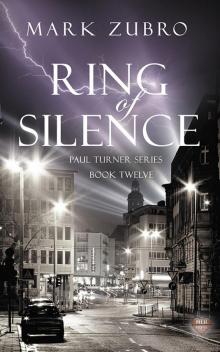 Ring of Silence
Ring of Silence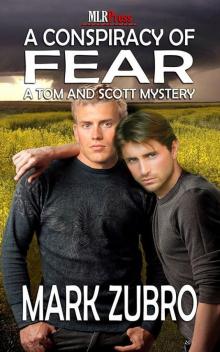 A Conspiracy of Fear
A Conspiracy of Fear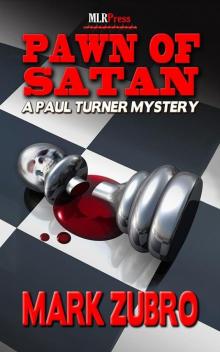 Pawn of Satan
Pawn of Satan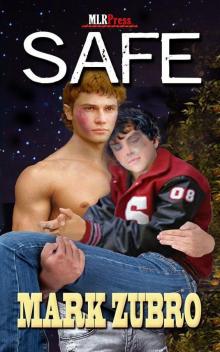 Safe
Safe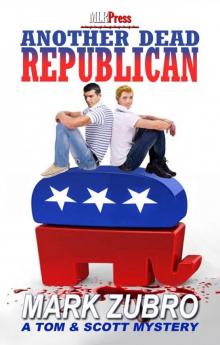 Another Dead Republican
Another Dead Republican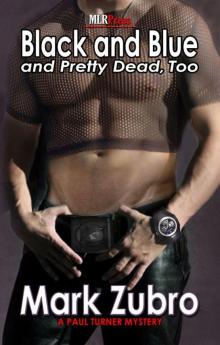 Black and Blue and Pretty Dead, Too
Black and Blue and Pretty Dead, Too Alien Home
Alien Home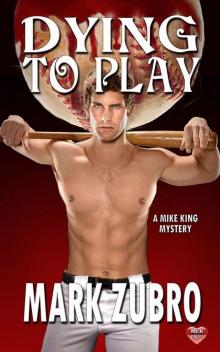 Dying to Play
Dying to Play Alien Victory
Alien Victory